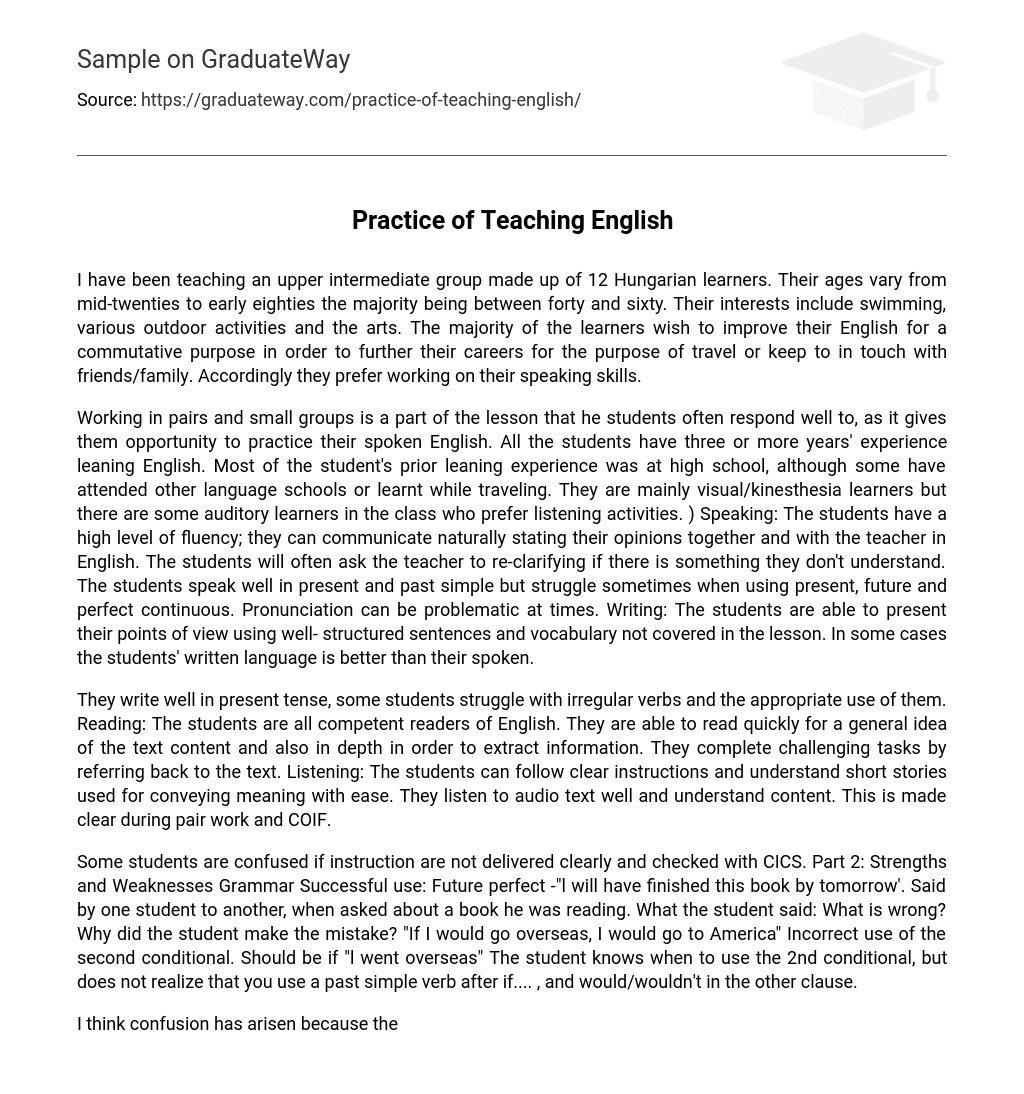I have been teaching an upper intermediate group made up of 12 Hungarian learners. Their ages vary from mid-twenties to early eighties the majority being between forty and sixty. Their interests include swimming, various outdoor activities and the arts. The majority of the learners wish to improve their English for a commutative purpose in order to further their careers for the purpose of travel or keep to in touch with friends/family. Accordingly they prefer working on their speaking skills.
Working in pairs and small groups is a part of the lesson that he students often respond well to, as it gives them opportunity to practice their spoken English. All the students have three or more years’ experience leaning English. Most of the student’s prior leaning experience was at high school, although some have attended other language schools or learnt while traveling. They are mainly visual/kinesthesia learners but there are some auditory learners in the class who prefer listening activities. ) Speaking: The students have a high level of fluency; they can communicate naturally stating their opinions together and with the teacher in English. The students will often ask the teacher to re-clarifying if there is something they don’t understand. The students speak well in present and past simple but struggle sometimes when using present, future and perfect continuous. Pronunciation can be problematic at times. Writing: The students are able to present their points of view using well- structured sentences and vocabulary not covered in the lesson. In some cases the students’ written language is better than their spoken.
They write well in present tense, some students struggle with irregular verbs and the appropriate use of them. Reading: The students are all competent readers of English. They are able to read quickly for a general idea of the text content and also in depth in order to extract information. They complete challenging tasks by referring back to the text. Listening: The students can follow clear instructions and understand short stories used for conveying meaning with ease. They listen to audio text well and understand content. This is made clear during pair work and COIF.
Some students are confused if instruction are not delivered clearly and checked with CICS. Part 2: Strengths and Weaknesses Grammar Successful use: Future perfect -“l will have finished this book by tomorrow’. Said by one student to another, when asked about a book he was reading. What the student said: What is wrong? Why did the student make the mistake? “If I would go overseas, I would go to America” Incorrect use of the second conditional. Should be if “l went overseas” The student knows when to use the 2nd conditional, but does not realize that you use a past simple verb after if…. , and would/wouldn’t in the other clause.
I think confusion has arisen because the student doesn’t know the rule. Error: Vocabulary Successful use: “This crime is a minor Said during a lesson, covering words connected with crime, when referring to a man stealing an apple. *Not covered in class. Error: What the student said: “He has experience about job interviews” The student has used the wrong preposition to express someone having experience. Should be “with” The student has become confused about the appropriate preposition to use. Not realizing that “with” is used when referring to a countable noun. They have confused it with “He knows about…… Pronunciation Successful use: “It’s a rural area”. Rural pronounced Error: try to drink plenty of /Vow:TA/ every day. The student has pronounced water row:TA/ as Pater “vow:TA/. The student pronounced [w/ as /v/. This is a mistake commonly made in class. I feel this is because of Al interference. As the /w/ sound is not used in the Hungarian language. Part 3: Helping the learner 1) Grammar: Using the correct form of the 2nd conditional. To help deal with this mistake I have chosen: Unit 30, Exercise 1, Page 75 of “Elementary Language Practice” by Michael Vince, Publisher: MacMillan. (see attachment)
The activity is to put various verbs (provided in brackets with each sentence) into the past simple and insert them into the first clause. Then in the second clause of the sentence the student has to insert would were appropriate. The aim is to get the students familiar with the correct formula of the second conditional (if + past simple + would + verb). This activity is suitable for the students because it deals exactly with the mistake the student made. The student said “If I WOUld go overseas, I would go to America” indicating that they are not aware of the correct form of the 2nd conditional.
By allowing the students controlled practice of the 2nd conditional in this way, I feel it will allow them to see how the 2nd conditional is formed correctly. Would use this activity in a Test Teach Test lesson on the 2nd conditional. Prior to giving the students the activity I would go over the meaning and correct form of the TTL with the students on the board as they are mostly visual learners. Also practice pronunciation. Making sure they have understood using CSS. During the activity I would monitor making sure the students are doing the activity correctly and micro teach were necessary to re-clarify. Pronunciation: Pronouncing ‘w/ correctly The aim of this activity would be to demonstrate the different sounds that / v/ and ‘w/ make to enable students to pronounce these sounds naturally. It is an appropriate activity because the majority of the students struggle with the difference in these sounds. The activity would be during the teach stage. I would say a word beginning with ‘w/ (whale) modeling the correct pronunciation of / w’. The students would then repeat the word. ‘Drilling’ the pronunciation with the students. I would then repeat this process with the ‘v/ sound (vile).





